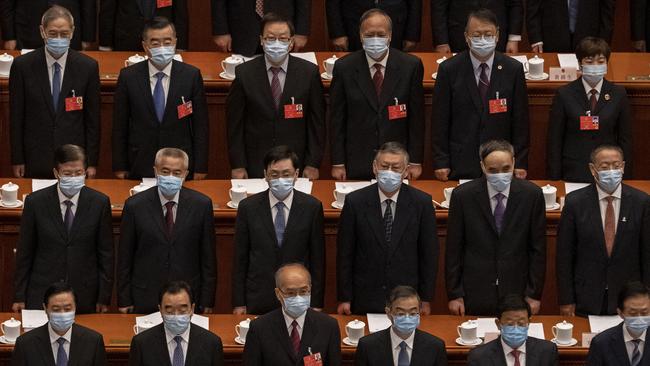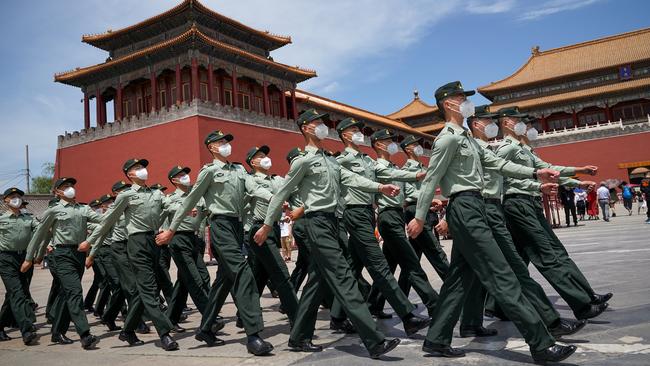Party’s over for the bullies of Beijing
China has shown its true colours to the world, and it will suffer consequences. Australian citizens won’t allow a return to just shutting up and taking the money.

There is no more urgent policy imperative for the Morrison government than to start to unpick the most damaging aspects of interdependence with the People’s Republic of China.
Frankly, this has been obvious for years. Governments of all political stripes have gone to extraordinary lengths to look the other way whenever the Chinese Communist Party’s bad behaviour — in everything from human rights abuses to industrial-scale cyber-spying and intimidating Australian-Chinese citizens — risked damaging the economic pipeline.
To be sure, when hard decision points could no longer be avoided, Australian federal governments made the right choices to modernise our anti-espionage laws, keep “high-risk” (meaning Chinese) companies out of the 5G network and push back against Beijing’s influence, buying domestically and in the Pacific island countries.
But too often these actions were accompanied by unbelievable denials that the policy steps in question had nothing to do with China — they were “country agnostic”. This softly, softly approach has been immensely damaging for Australia’s interests. It is what made it possible for our universities, some state governments and sections of the business community to continue deepening interdependence with China without properly considering the risks of a democracy building an addictive reliance on an angry one-party state.
The effect has been invidious. Consider the content of so much media reporting of Australia-China relations. Through accident or negligence, a virus from Wuhan is unleashed on the world and hidden by the Communist Party for weeks in ways that led to hundreds of thousands of deaths and a global depression.

But much media reporting would have it that Australia’s sensible and balanced call for an open investigation of the virus is the reason why Beijing puts tariffs on barley, bans beef purchases and threatens coal exports. Far too much effort is made by policy-makers and analysts to examine how the tone of our words and actions will be received in Beijing when Australian governments are elected to speak for our national interests.
Likewise, the many calls for Australia to snap back to its pre-coronavirus relationship with China should force a national discussion about what that really means. Are we to “snap back” to saying nothing about the origins of COVID-19, to ignore Beijing’s illegal annexation of the South China Sea, illegal undermining of Hong Kong, increased pressure on Taiwan and mass human-rights violations in Xianjang and elsewhere?
Snapping back to shutting up and taking the money is not a viable option for Australia. It would be rejected by many Australian citizens and is not in keeping with our national values and strategic interests.
The option is not viable because the CCP seems to be on a self-destructive path towards more aggressive and intolerant policy positions. Reports last Thursday of the CCP proposing further repressive security laws for Hong Kong are particularly concerning.
In the words of the Chinese embassy, laws “establishing and improving the legal framework and enforcement mechanism for safeguarding national security” in reality just attack Hong Kong’s autonomy and undermine the so-called “one China, two systems” policy.
Beijing’s harder-line approach to Hong Kong is evident on other policy matters as well. The CCP is doing its best to narrow Taiwan’s capacity to operate in the international community as a successful democracy. If there is criticism of the CCP anywhere in the world, China’s “wolf warrior” diplomats will respond with insults and threats of retaliation.
It is a mystery how anyone in a leadership position in Beijing could hope that this panicked assertiveness will promote China’s long-term interests. What we are observing around the world is centrally co-ordinated, not accidental.
My supposition is that Beijing’s aim is to draw the attention of Chinese citizens away from the party’s domestic failings and on to nationalist aspirations for regional dominance.
Unwise as Beijing’s strategy is, it helps to clarify the choice Australia and other countries in the region face. China’s own bullying actions make it clear that we now need a plan for strategic distancing between ourselves and the CCP.
To be clear, strategic distancing does not mean completely disconnecting from China. It does mean that we need a sector-by-sector assessment of where and how to reduce unhealthy dependence and a plan to build other more trustworthy markets.
This will take years and there will be economic casualties, not necessarily because of political retribution from Beijing so much as the effects of the post-COVID global depression.
Strategic distancing probably will have a limited impact on Australia’s four biggest commodity exports to China: iron ore, natural gas, metallurgical coal and gold. China needs assured, quality, long-term supply of these products and Australia provides this in a way that Brazil and others cannot without significant transition costs to Beijing. Economics, rather than CCP politics, will drive demand for the first three commodities, and gold is likely to do well in depression years.
On food products, China needs protein and Chinese people value Australia’s reputation for clean, green, uncontaminated products. The CCP can apply tariffs to barley and will presumably threaten other sectors with similar retaliation, but Chinese consumers will also be punished by such moves. That complicates the party’s ability to be too punitive.
On education and tourism, frankly no one knows how long travel restrictions will put these industries into the deep freeze. The more dependent our universities are on the Chinese market, the greater the risk some institutions may fold. We built this dependence; China didn’t force it on us.
Universities will have to diversify and rethink their business model. A greater challenge will be to review and reduce the many hundreds of research connections between Australian and Chinese institutions.
An overall blind spot in this debate has been a failure to understand that China’s economy is struggling as a result of the pandemic, meaning consumer demand and Chinese exports are in trouble. That alone means trade won’t grow as recently projected.
Australian Strategic Policy Institute research has set out in detail the open and covert connections that link many Chinese research centres back to their military and intelligence services. Frankly, Australian universities have been played by savvier counterparts looking to steal or develop intellectual property that will give China a military edge.
Chinese purchasing of Australian residential property has been falling substantially since 2015 and the Treasury has recently taken “temporary” steps to review all foreign purchases of businesses and critical infrastructure, regardless of purchase cost. That lends some confidence that distressed Australian businesses won’t be acquired by China in a COVID fire sale.
A far more challenging task for the Morrison government will be to work through past sales of ports, medical facilities and businesses, the electrical grid, gas infrastructure, IT systems and the rest.
If the government doesn’t trust so-called “high-risk vendors” to be part of the 5G network, it can hardly trust them to be running other parts of critical infrastructure. Last week, the Department of Foreign Affairs and Trade warned “malicious cyber actors are seeking to damage or impair the operation of hospitals, medical services and facilities, and crisis response organisations outside of Australia”.
Crucially, DFAT said it wanted “countries to cease immediately any cyber activity”, rather than pointing to non-state criminal groups. China is one of a very small number of countries with the cyber capabilities to reach into and damage the IT systems running critical infrastructure.
It is true China doesn’t need to own critical infrastructure to be able to damage it, but ownership and control can facilitate malicious cyber access. This will all have to be pared back over time.
Recently published work by The Henry Jackson Society in the UK reveals in sobering detail that of the Five Eyes intelligence countries (UK, Canada, US, Australia and New Zealand), Australia has the highest level of dependence on Chinese imports for a vast range of critical items. We have seen the implications of this for personal protective equipment. Beyond that, Australia has allowed itself to become dependent on a single market for pharmaceuticals, chemicals, fertilisers, resource extraction, manufacturing equipment, and even some foodstuffs.
In some cases, it may be acceptable to let these dependencies continue; in others, a review of these connections informed by a national security perspective might conclude that being addicted to a Leninist sole supplier is dangerous.
The CCP’s Australian supporters tell us that China is just too big a market to replace. The truth is we haven’t tried very hard to do that. Beijing’s flailing actions in recent months suggest to me a fragility that has Beijing spooked. The CCP is not too big to fail. Australia should be positioning to make sure we don’t go down with that ship.
Peter Jennings is the executive director of the Australian Strategic Policy Institute and a former deputy secretary for strategy in the Department of Defence.


You know things must be serious when Trade Minister Simon Birmingham, usually unfailingly on message about our trusted and mutually respectful relationship with Beijing, says it is time to diversify Australia’s export markets.